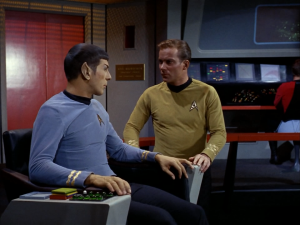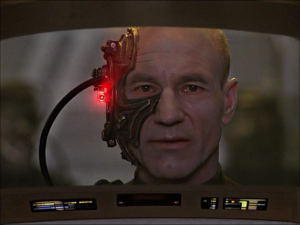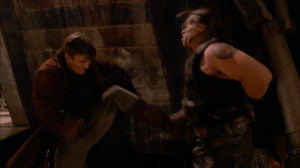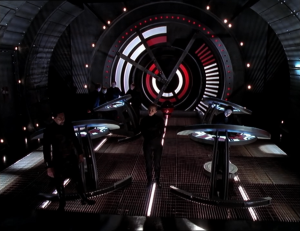The Concept of the “Anti-Star Trek”
- November 3rd, 2014
- Posted in Opinion/Analysis
- Write comment
 There’s no denying that Star Trek is a massive cultural force in America and throughout the world. It’s become almost synonymous with sci-fi, and the pop culture image of the nerd or geek stereotype is inevitably a young man with some kind of Trek paraphernalia on him. So it’s no shock that, as time went on, people would try to draw attention to their own works by comparing them to Star Trek. And thus emerges this idea of “the Anti-Trek,” a nebulous descriptor if ever there was one. It’s a term that’s been applied from shows as varied as Blake’s 7 in the 70’s to Farscape to the reimagined Battlestar Galactica. To figure out just what this means, and establish what traits an “Anti-Trek” must possess, we’ll have to examine the show itself and what each series is comparing to.
There’s no denying that Star Trek is a massive cultural force in America and throughout the world. It’s become almost synonymous with sci-fi, and the pop culture image of the nerd or geek stereotype is inevitably a young man with some kind of Trek paraphernalia on him. So it’s no shock that, as time went on, people would try to draw attention to their own works by comparing them to Star Trek. And thus emerges this idea of “the Anti-Trek,” a nebulous descriptor if ever there was one. It’s a term that’s been applied from shows as varied as Blake’s 7 in the 70’s to Farscape to the reimagined Battlestar Galactica. To figure out just what this means, and establish what traits an “Anti-Trek” must possess, we’ll have to examine the show itself and what each series is comparing to.
At its heart, Star Trek is probably one of the most positive visions of humanity’s future in the popular consciousness, if not all of fiction. The Federation is a world without poverty or internal strife, a world where the wonders of the universe are available to any man or woman who wants to put forth the effort to seek them. There’s enough for everyone, not just to survive, but to thrive, and now people are free to work for self-actualization, not money or necessities. The crew of the Enterprise is there because they want to be, not because they have to work to live. Most of the conflict in Trek comes from outside forces, and even then, it’s almost always possible to get through to the enemy. Look at the Klingons: brutal war between them and the Federation in Kirk’s era, but the Federation’s most trusted allies by the time of TNG, and there’s every indication that a breakthrough with the Romulans is next (or was next, anyway, before J.J. Abrams blew up Romulus). Once humans can appreciate and value their differences, they can value those of others as well, and common ground can be found with anyone.

The Borg act as a shadow archetype of the Federation, where uniformity is valued over individuality.
So if you want to paint the opposite of that, what would you do? Star Trek itself has created dark counterparts to the Federation more than once. The Dominion, as a massive interstellar government made up of multiple species that’s looking to expand, makes up a clear contrast. Whereas the Federation values the differences, and wants everyone to be equal in their system, the Dominion is concerned with subjugation and uniformity. The Borg, too, are an expansionist collective society made up of hundreds, perhaps thousands of different species, where each individual is put to work at what they do best. But where the Federation comes in peace, offering friendship, the Borg have only one offer to make: assimilation, or destruction. Resistance is futile. And that’s without touching on the Terran Empire, the Mirror Universe’s version of the Federation where humanity did not learn to quell its warlike nature before taking to the stars (and ultimately paid dearly for it).
Blake’s 7, as the first anti-Trek (and created by Terry Nation, better known for creating Doctor Who‘s Daleks), flips this around by making the Federation the enemy. Of course, the Federation in that show is nothing like Star Trek‘s, but it does provoke a certain idea–namely, how would the Federation look to you if you didn’t want to be part of it? It’s an allegation that’s been thrown at the Federation before, most notably by the Maquis. But where Trek has great faith in humanity to be just and rational and enlightened, Blake’s 7 had none of that. The bad guys are fascist dictators, and the protagonists are surly, mean criminals who are really in it more for their own survival than as part of a brave and daring fight against evil. Blake himself is the only one who really was a rebel and desired to take down the Federation, but even he’s manipulative and vicious at times, and he’s far too quick to let things get to his head. Compared to your upstanding Star Trek crews, particularly TOS since that’s all that existed at the time, and it’s no contest who’s the more respectable crew. You certainly wouldn’t catch Kirk or Spock throwing a fellow officer under the bus to save themselves. And ultimately, it’s these negative traits that prove to be their downfall.
Compare this with a more modern show, one that’s post-TNG. Firefly, for example, has a lot in common with Blake’s 7: there’s a former rebel leading the crew, they do what it takes to survive and stay out of the way of the Alliance. The characters are on their own, without any major organization like Starfleet for support. Neither show’s universe is a nice place to live. The original Star Trek‘s story structure was often compared to a Western (see Gene Roddenberry’s original pitch, “Wagon Train to the Stars,” which was comparing it to an actual Western series at the time) and Firefly runs with it, embracing that Western aesthetic very fully. But where Blake’s 7 featured these often unlikable criminals, Mal’s crew are eminently likable, right from the start. And better still, they have an intense loyalty. The one thing that’s most important to Mal is taking care of his crew. Sometimes that means doing less-than-moral things, but even Mal has lines he won’t cross, like stealing medicine in “The Train Job.” He may be distrustful of Simon and River at first, but once they’re aboard Serenity, they’re his crew, and he’ll fight for them as much as anyone. Firefly‘s other major difference from Star Trek is in how it generates conflict. Trek‘s characters, especially by the time of TNG, were not supposed to have much interpersonal conflict, and this applied to almost all humans. Conflict in early TNG is exclusively generated by aliens contact. Firefly made that impossible from the start, because there are no aliens. Every conflict, no matter how petty or vile or massive, is between humans with a disagreement.
Firefly is far from the only show in that era to have the phrase “anti-Trek” used to describe it. Most of them emerge in this time, which is not coincidentally when franchise fatigue was starting to set in. Enterprise was on its last legs, and Trek had been on the air for nearly 20 years straight. So alongside Firefly, we also get Farscape, a show that freely admits drawing direct inspiration from Blake’s 7 (don’t believe me? Compare Servalan and Grayza). It, too, features a crew of criminals and outlaws, fleeing the human (well, Sebacean) centered fascist Peacekeepers, but takes this to wildly different places. Blake’s 7 has the Federation dominating the galaxy, but the Peacekeepers are pretty much just a regional power in Farscape, with a massive challenge coming from the Scarrans, who make the brutality of Peacekeeper forces look like play time by comparison. Farscape also runs counter to Trek in that while Trek was always said to have a “free love future,” where jealousy is not a problem and sex is viewed as healthy and necessary, we never really see much evidence of this on screen. Farscape has so much overwhelming sexual subtext (and text-text) to almost everything that it’s a critical point to the story at several junctures. Farscape‘s crew is also extremely diverse, with Crichton as the only human (and one of only two characters without makeup) and several of the characters aren’t even humanoid at all, with a few portrayed by puppets. It even reaches a metafictional nature in that Crichton is a fan of Star Trek and has a great amount of familiarity with the tropes and cliches of the sci-fi genre–and then we see just what that knowledge gets him in Farscape‘s universe.
So now we reach what, to me, really hit the maximum levels of “Anti-Star Trek,” and that wasn’t necessarily a good thing for us. The Battlestar Galactica reboot premiered in this same window of time, starting up as a full series in late 2004, right as Enterprise was canceled. And BSG was run by one Ronald D. Moore, who’d been a huge trekkie all his life and a Trek writer from TNG to the end of DS9. If anyone in the industry understood the show, it was him. He had, originally, tried to move from DS9 after it ended to Voyager, where he was frustrated by their resistance to arc-based storytelling and general unwillingness to address what he thought should be at the core of the premise. It’s not a coincidence that both Voyager and BSG are about lost ships in hostile territory, untold distances away from home. Like Firefly, BSG has no aliens; only the humans and their creations, the Cylons. It took a hard, serious drama approach, eschewing morality plays and occasionally tacitly endorsing concepts (like military dictatorship in a crisis) that most Star Trek characters would find appalling. The show is also devoid of many of the other frequent sci-fi concepts, like time travel and alternate realities and space anomalies, keeping it grounded firmly in the character drama, while still including lots of religious elements and themes of faith that Star Trek rarely ever touched on. Galactica is a warship, not a junk freighter or a top-of-the-line exploration vessel or an unarmed living ship. And it’s not afraid to use that fact. Where the Enterprise is open and bright, Galactica is dark, windowless, more reminiscent of a submarine than a starship.

Tom Zarek: Criminal, Terrorist, and at one point the legally appointed leader of the human race, until the military disapproved.
Battlestar Galactica was, of course, praised by critics on its premiere for taking sci-fi in such a different direction, often saying that it was “doing things that Star Trek would never do.” It delved into dark issues, and that descent into the darkness was part of a general turn in media at the time (which I may elaborate on next week). Humans were on the edge of extinction, far from prospering like in Trek. The bad guys actually win and end up occupying New Caprica for a while. So in that regard, it was very much the “anti-Star Trek.” As Sci Fi Channel’s most popular show, they did everything they could to keep riding that. They created BSG prequels in Caprica and Blood & Chrome, trying to copy the dark and serious dynamic into other shows and franchises where it didn’t necessarily fit, like with Stargate Universe. It didn’t work, though; BSG had so thoroughly deconstructed the space opera that it was effectively dead, and to this day there hasn’t been one since it ended. Battlestar Galactica went so far in its quest to be as diametrically opposed to Trek as it could that it basically scorched the Earth as it passed. But that’s a discussion for another day.
From these examples, we can start to assemble a picture of what “anti-Trek” really means. Humans and their society must be flawed, not proto-utopian. Conflict comes from within the human race, not exclusively from outside forces (although they may exist). Our protagonists are often on the edges of society, rather than at the center and with the full force of the human race behind them. The answers don’t come easily, and who’s right and who’s wrong isn’t always clear. Faith and religion can play a prominent role, as a source of strength for characters. And most commonly, individuality and independence is placed above all else.
Which of these shows do you think best serves as the antithesis of Star Trek? Did I miss any? Let me know in the comments, or hit me up on twitter.






No comments yet.